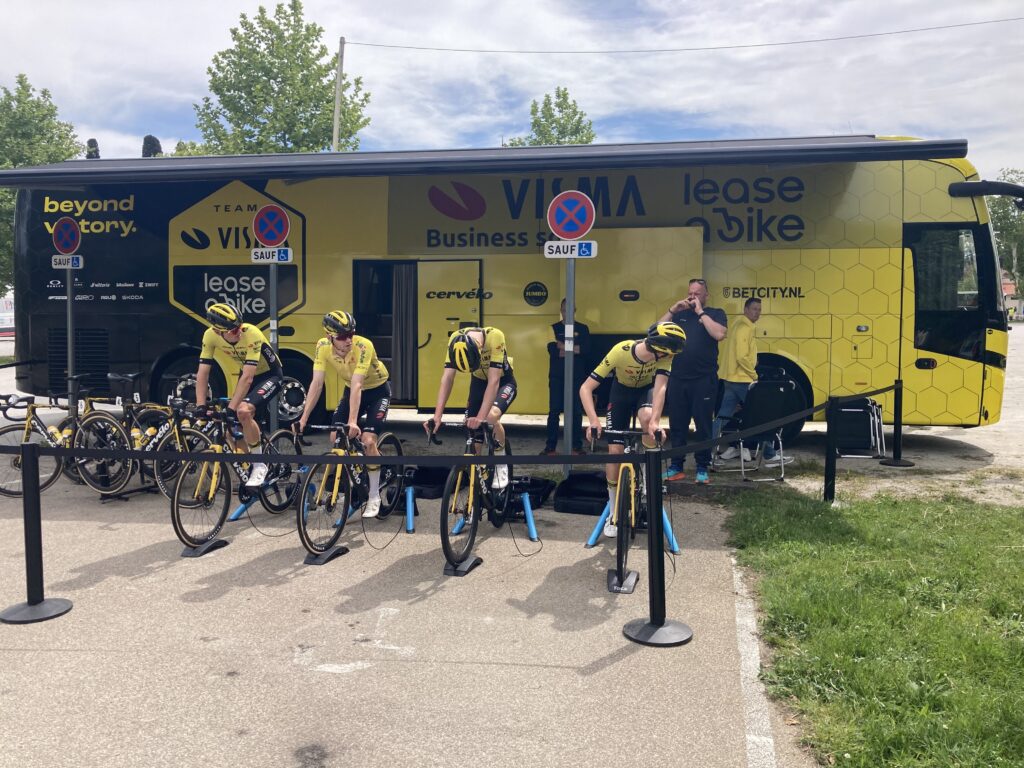Words and photos by Peter Cossins
Won in recent years by Pavel Sivakov, Stevie Williams and Johannes Staune-Mittet, last week’s Ronde de l’Isard gave the current crop of U23s the chance to showcase their talent
Despite their undisputed place as one of the iconic locations in bike racing, and particularly the Tour de France, the French Pyrenees have never been particularly fertile ground for race organisers, and that’s even more the case in the current era. This year, with the Route d’Occitanie on ice for a season due to the policing demands of the Paris Olympics, the racing calendar in this part of the world has been reduced to the five-day Ronde de l’Isard under-23 race, which took place last week, and next month’s three-day CIC-Tour Féminin International des Pyrénées.
It wasn’t always like this, though. In the not too distant past, the French side of the chain hosted a one-day and, later, a stage race version of the Tour des Pyrénées, as well as both a men’s and women’s version of the Tour de l’Aude. The former was established first in the early 1970s and its winners included Lucien Van Impe, Bernard Hinault, Francesco Moser (twice) and Phil Anderson (also twice). A dozen years after setting that up, organiser Jean Thomas set up a women’s edition that enjoyed a far longer life. Its podium featured just about every major name between the mid-1980s and the first decade of this century, including Maria Canins, Jeannie Longo, Leontien van Moorsel and Marianne Vos, who was third in the final edition in 2009.
“Among those who have finished on the lower steps of the podium are David Moncoutié, Jonathan Castroviejo, George Bennett, Joe Dombrowski, Dylan Teuns and Tiesj Benoot”
There’s an obvious reason for this paucity of races compared to many other French regions. There are very few sizeable towns in these mountains, and without a significant audience it’s always going to be difficult to sustain a major stage race. It’s to the credit of Pierre Maurel, Alban Damase and José Serrano, who founded the Ronde de l’Isard in 1977 and ran it for so many years, and to current organiser Guy Sans and his team that they’ve not only kept this race afloat for the best part of half a century, but that it’s become well established as one of the most prestigious under-23 events on the calendar.
It’s regularly highlighted many of the best upcoming talents. Past winners include Denis Menchov, Kenny Elissonde, Pavel Sivakov, Stevie Williams and Johannes Staune-Mittet. Among those who have finished on the lower steps of the podium are David Moncoutié, Jonathan Castroviejo, George Bennett, Joe Dombrowski, Dylan Teuns and Tiesj Benoot. It provides young racers with the opportunity to test themselves on some of the sport’s most renowned climbs. The latest edition, for instance, featured a stage into Luchon via the Hourquette d’Ancizan, Azet and Peyresourde passes, another that tackled the steepling western flank of the Portet d’Aspet, and a ‘queen’ stage that finished at Plateau de Beille, the Tour de France’s destination on Bastille Day this summer.

The five days of racing produced winners from five different teams, although one stood clearly above the rest. Visma | Lease a Bike arrived with a fully-fledged team bus that dominated each dusty car park used for race starts and with a powerful sextet of racers. At the end of the last season, the team’s boss, Richard Plugge, told RadioCycling, our sister podcast, that the Dutch’s set-up is always looking five years ahead in the quest to find the next Jonas Vingegaard, Wout van Aert and Olav Kooij, and the Isard underlined this.
Their initial leader was 19-year-old Norwegian Jørgen Nordhagen, third in the recent U23 Liège-Bastogne-Liège and winner of a stack of junior races last season. He took a leaf out of the Pogačar/Evenepoel/Vingegaard playbook by attacking from 60km out on the second stage. The lone leader over the Azet and Peyresourde passes, he cramped up on the run-in to Luchon, where he was caught by Max van der Meulen of the CTF-Victorious, Bahrain’s feeder team, the latter taking the stage as Nordhagen took a very firm grip on the yellow jersey.
The Dutch team had to reshuffle its little pack twice during day four to Plateau de Beille. Race leader Nordhagen woke up with a fever and wasn’t able to start, so Tijmen Graat took over as their GC hitter. However, he soon succumbed to illness too, which resulted in a promotion for mountain domestique Darren van Bekkum, seventh overall at that point, 40 seconds behind Lotto-Dstny duo Jarno Wider and Milan Donie.
With just three teammates to lean on, including first-year under-23s Tomos Pattinson (formerly of my colleague William Fotheringham’s Mapei-backed Halesowen CC team) and Jonas Høydahl (19-year-old son of mountain biking legend Rune), Van Bekkum followed Nordhagen’s example by going for broke on the climb to Plateau de Beille, a solo win there putting him almost a minute ahead of Tudor Pro Cycling U23’s Robin Donzé. Trinity Racing were also very active during that stage and were rewarded with second place for Will Smith, who also retained the mountains jersey.
The final stage always runs into the race’s home town of Saint-Girons, via the mountains of course. On this occasion, Sans and his team opted for a route that climbed up to the Col de Portel via the narrow road that ascends the northern flank of the neighbouring Col de Péguère. It’s one I know well – and avoid. It’s typically Pyrenean, the gradient fluctuating constantly, the top section featuring numerous steep ramps well into double percentage figures.
On the fast and technical descent away from the Portel, 16 riders came together, including no fewer than three from the Trinity team managed by former Sky pro Pete Kennaugh, who was keen for them to finish with a stage win. Joe Pidcock delivered it, bursting clear on Saint-Girons’ main street, with Van Bekkum safely in the pack behind him, the overall title his, 18-year-old Jarno Wider finishing runner-up, just ahead of Visma’s Menno Huising.
To those names already mentioned and who are well worth keep an eye on during the Baby Giro and Tour de l’Avenir, I’d add CTF’s young Brit Oliver Stockwell, edged out by Pidcock in Saint-Girons and fifth overall, Australians Luke Tuckwell (Trinity, 6th) and Matt Greenwood (Team Bridgelane, 8th), and also 19-year-old CC Étupes rider Bjoern Koerdt. Of partly Swedish extraction, he hails from Yorkshire, is backed by the Dave Rayner Fund and was tipped to do well in this race until he broke a collar-bone on day two. He’s aiming to be back in Nations Cup action for Great Britain soon and hoping to make the cut for the British team that will go to the Tour de l’Avenir in August.
From a personal point of view, it was a successful week too, one where I actually felt like a cycling journalist again. It was, though, a fleeting reacquaintance, as I’m about to embark on a new writing project that will, if it pans out as planned, take me the length and width of the Pyrenean chain. While I won’t be riding at anything like the same speed as Van Bekkum, Wider, Nordhagen and their peers, I will head into the mountains with the same desire for exploration and well knowing that I’m going be pushed to my physical limits. This is, after all, what the mountains are all about for and what draws so many of us into them.






